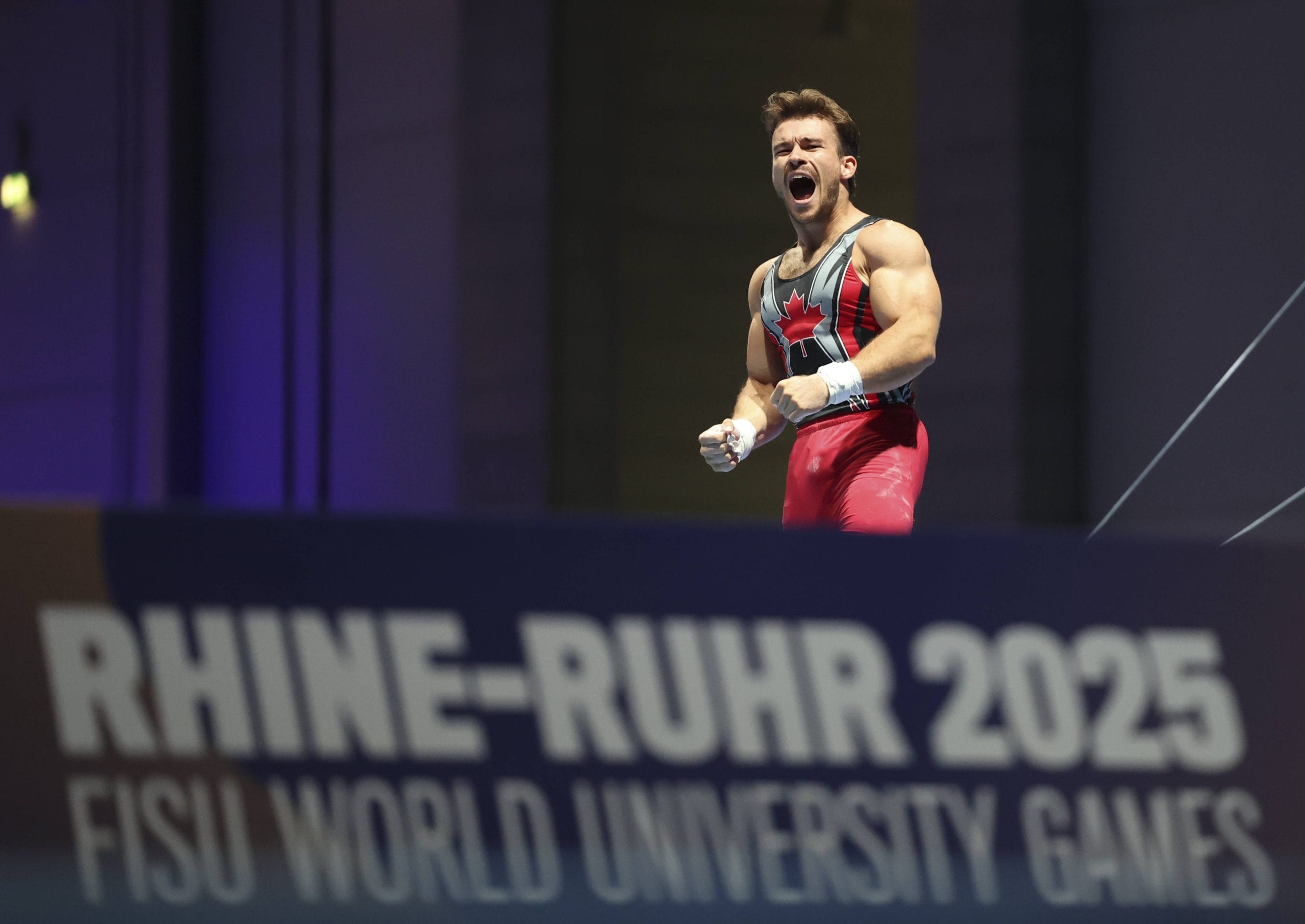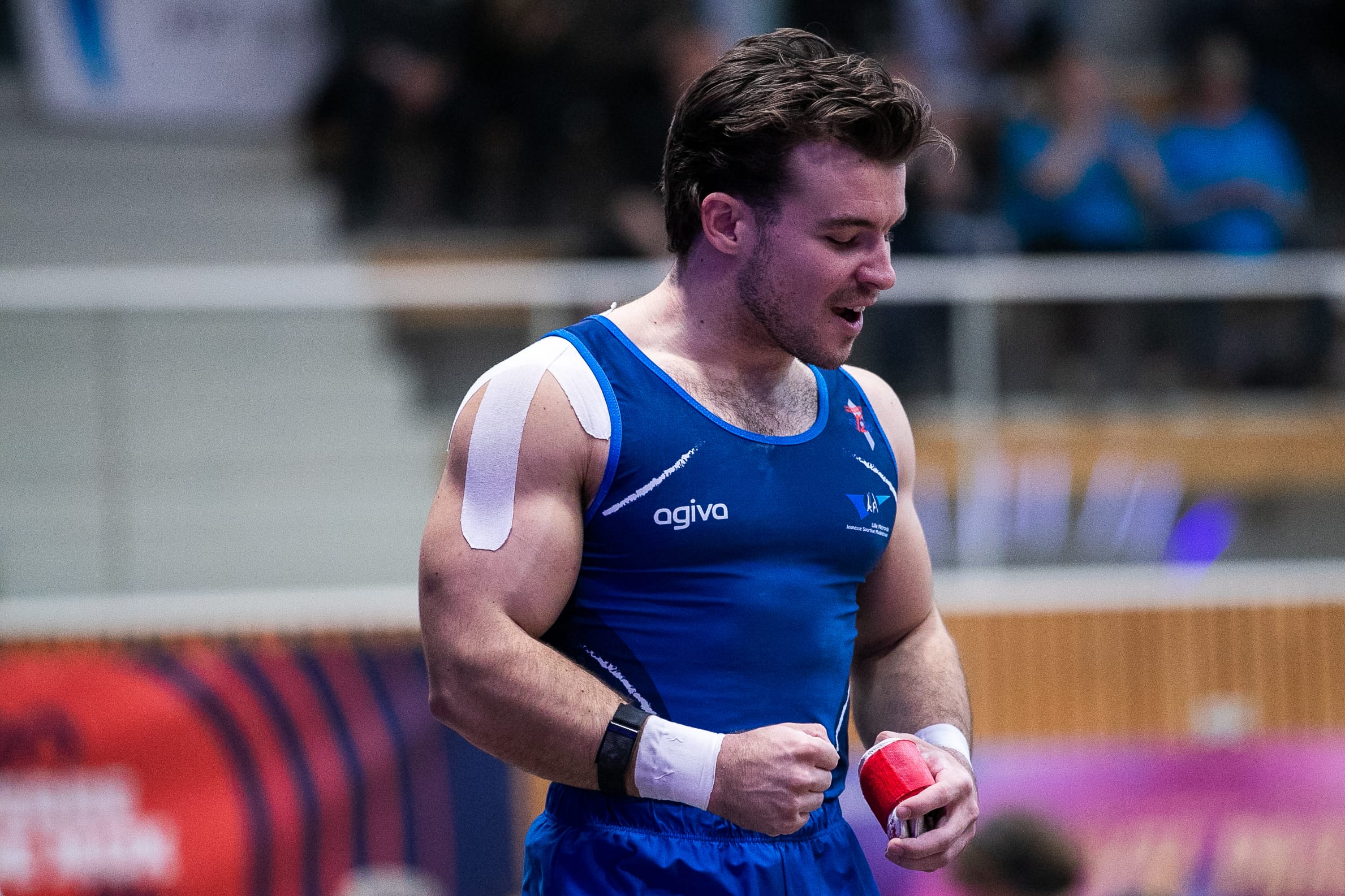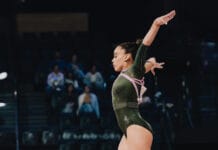The Canadian gymnast, an Olympic finalist in Paris, contributed to the Canadian team’s third-place finish at the FISU Games, as well as La Madeleine’s second-place finish in the last season of the Top 12 in France. William Émard talked to Spot Gym about his career, his three medals at the FISU Games, his attachment to the French competition, and his goals for upcoming international events.

Spot Gym: Can you start by introducing yourself and telling us how you got into gymnastics? What attracted you to the sport?
William Émard: I started gymnastics at the age of four because my sister was doing it too. There were really two sides in my family: an ice hockey side and a gymnastics side. My brother played hockey, but I wasn’t interested in that sport, so by default I became interested in gymnastics and signed up for a class. Then I gradually fell in love with it and worked my way up the ranks. At first it was just for fun, but then I joined the junior national team, then the senior team, and competed in major international events.
Is it possible to become a professional in Canada?
Let’s say that it’s a semi-professional sport, because there is no national league like the Top 12, the Bundesliga, or the Serie A. We remain in the amateur sport, but we manage to find sponsors, and the Canadian government funds us to help us continue training. However, only a small number of Canadian gymnasts can make a living from it, and I’m very happy to be one of them.
How does access to high-level competition work in Canada?
Our place in high-level competition is calculated based on the averages of our two national competitions each year. Every six months or so, we have a national selection competition: Elite Canada in January/February and the Canadian Championships in May/June. This allows us to be ranked on the national team and meet the standards to be part of Team Canada.
Do you have a fixed training location, or is the national team spread across the country?
Historically, we were much more spread across Canada because the management was done on a provincial basis, since it’s a large territory and we were all thousands of kilometers apart. But over the last two years, there has been a bit of centralization. I’m from Montreal, as are Félix Dolci and Samuel Zakutney. We are three Olympians who train at the Olympic Stadium or at our club in Laval. All of this has made people a little more interested in how we train, and we feel that it has encouraged other gymnasts to come and train with us. Some Ontarians have moved, and there have been many changes in clubs among national team members to get closer to us.
We are affiliated with the Laval Excellence club, which is a city located north of Montreal.
You’ve just come back from the FISU Games. How was the Canadian team selected?
It’s not like other competition for FISU because most countries allow members of the national team who want to and can afford to spend the necessary amount of money to participate in this competition. Felix (Dolci), Yanni (Chronopoulos), Jayson (Rampersad), Matteo (Bardana), and I were interested in competing despite the cost, because it’s not funded by Gymnastics Canada. So there wasn’t a selection process as such. The cost is 7,000 Canadian dollars (4,396 euros), which is still quite considerable! But we should receive assistance from various organizations, we have a few sponsors, and we are working hard to try to reduce the bill as much as possible, but with the good results we’ve had, I think it will be fairly easy.
This was the last year I could participate in this event because it’s open to people aged 26 and under, and I’ll be 27 in two years.
We tried to put together the best team we could to achieve good results, and everything went well because it was a success for us.
What are you studying at the moment?
I’m studying for a bachelor’s degree in administration and marketing at UQÀM (Université du Québec À Montréal).
How did you find the competition, especially winning three medals?
It was really an emotional roller coaster. Our main goal was to do well as a team. We were aiming for a top 5 finish because we had never won a team medal for Canada in the history of the University Games. In the end, we came away with the silver medal, behind Japan, who completely dominated the competition. And ahead of Switzerland, our very good friends, who came in third. It was truly a dream podium, and it was also the first time we beat the United States. On an individual level, it was also a great performance for me with my return to the all-around competition, where I won the bronze medal, which means a lot to me. In 2021, I managed to do some great things individually, but since then, I’ve often been injured or underperformed. The same thing happened in Paris, where I had a problem with one of my wrists, so I couldn’t compete in the all-around competition.
I’m happy to have had a good team result and this bronze medal behind the two dominant Japanese gymnasts. We knew they were going to take the top two places, so we were “fighting” for third. I managed to beat the Americans, the Swiss, the Australians… So it was a really good performance on my part. Then there was third place on the rings. We knew that I could do it, and it was one of the goals: a medal on the rings. And once again, mission accomplished. I looked a little less happy when I got that medal, but I was just tired, especially emotionally, from the week, and it was the last day of competition.
Which apparatus did you have to leave out because of your injuries?
It was always the pommel horse that I had to leave out because of my wrist problems. Then in 2022, it was my first biceps tear that limited me to the rings. At the Paris Olympics Games, it was also a small problem in my wrist that bothered me.
Did this competition help you prepare for the World Championships coming up this fall?
Exactly! The other goal was also to see where I stood on the six apparatus and to prepare for Jakarta by testing new elements as well. I have a new move on the horizontal bar and pommel horse. I also wanted to try the triple back dismount on the rings, but unfortunately I didn’t get the chance because we decided to play it safe to secure the medal. On top of that, there was also the serious accident involving the Italian gymnast (Lorenzo Bonicelli) who fell on his neck when dismounting from the rings.
Otherwise, it was a great preparation and now I have a clear path to heal the little “boo-boos” I got at FISU. We saw that I had a strapped knee, so it would be good to fix that first. Nevertheless, there are a lot of things that passed the test, so we need to consolidate all that.
Are you already guaranteed a place on the team, or will there be another selection process before the competition?
No, there will be a selection process in September in Montreal to determine the team. I think it’s pretty much a given on my part with the latest results I’ve achieved.
What goals have you set for yourself for this competition if you make the team?
I would like to consolidate my movement on the horizontal bar by adding the Cassina (a straight somersault over the bar with a twist). I did it in the qualifying round, but we decided to remove it from the all-around final because I was in a good position. On the parallel bars, I’m also working on some new moves that I’d like to add to my routine.
On another note, do you think you’ll be back to compete in the Top 12 next season? The schedule for the 2025-2026 season has been released. What do you think of it?
Yes, I’ve already talked to Guillaume and Nicolas about it. They asked me if I was still interested, and I said yes. So I’ll have to see how my schedule works out with the World Championships in October, but I’d be more than excited to come back for the 2025/26 season. As I said, it’s a format I like, I think it suits me because there are slightly fewer dates, which means less traveling back and forth from Montreal. I’m also looking forward to seeing how the new format works out. But I’m happy to be back with this great team because we had a good season last year. But the experience is incredible, so I don’t see why I wouldn’t come back!
What motivated you to compete in the Top 12?
This is my third year with La Madeleine, so it was a natural continuation of events. I already knew the team and the coaches. I felt at home with the club, they treat me extremely well and the group dynamic is very good too, whether it’s with Énae (Fouchard), Julien (Maréchal), Tom (Masia Pacholczyk) or even the younger members. It’s kind of second nature to me now, it’s pretty simple because I have an advantage, I have more experience and have competed more. It’s a great experience too because the team is just incredible.
How did your integration into the club go, and how was your contact with the team?
It goes back to 2017 when we had the World Championships in Montreal. We welcomed a few athletes from La Madeleine and their coach Guillaume Noé to my club, at home, so they could come and do a little training camp with us.
Then, in 2021/22, I signed with Sotteville but was unable to compete because I was injured (torn tendon in my left bicep), unfortunately. Then I was put in as second reserve for the team. Guillaume knew I was interested in the Top 12, so he wrote to me and asked if I wanted to be part of La Madeleine, telling me I’d be their first athlete for all six apparatus, which was interesting for me. I knew Guillaume and what kind of coach he was, so it made sense for me to join them.
Are the competitions you have in Canada similar to how the Top 12 works?
Our movements as international athletes will be similar to what we do everywhere else, whether in Canada or other countries. We might play it a bit simplistic when we see that our opponent has messed up their move or performed an element poorly, which allows us to be more reactive and adapt, unlike in competitions in Canada. Otherwise, my moves and elements are generally the same. But it allows me to gain more experience and have one more competition under my belt.

Did you adapt your preparation for the Top 12 as a result?
Not really, I kept almost the same moves that I usually compete with. During the final week of the Top 12, on Thursday I was competing in Germany for the DTB Pokal and then I took the train to Haguenau. So I would say that the routines are quite similar, but as I said, sometimes we simplify things if it’s not worth it. But in general, I try to maintain the same level internationally, even if I’m in the Top 12.
Why did you choose to skip the apparatus finals at the DTB Pokal to compete in the Top 12 final?
It was simply a commitment I had made to La Madeleine even before competing in Germany because I wasn’t supposed to compete with Team Canada, but I replaced a gymnast who was injured. I had already agreed to compete in the final, and Team Canada allowed me to skip the finals. But to be 100% honest, I wasn’t in the best shape for international competition and was still recovering after the Olympics. So I didn’t expect to make the apparatus finals, and in the end I qualified second on floor and rings. It was a nice surprise, and it was a bit disappointing to miss those finals, but I have absolutely no regrets about my choice because the Top 12 final was very close. It was a great experience.
Do you plan to compete in other national championships in other countries, or do you prefer to stick with the Top 12?
I’ve already done it in the Bundesliga with Germany, but if I had to choose between the countries that offer this opportunity, namely France, Italy, and Germany, I would choose France. It’s a good volume without being too demanding. The German schedule is more condensed and intense because we compete on all six apparatus in every competition and there are seven or eight group matches. But if a German team offers me a place, I’ll consider it.
Getting back to the Olympics, since you mentioned them, how did you find the experience?
It was incredible and larger than life, I would say. Yes, they are the Olympics, but fundamentally it’s still a competition we’ve done before: it’s floor, it’s vault, it’s rings. It’s a bit like going back to basics, where you have to strip away the excess, the energy or aura that the Games have. You have to try to put that aside and focus on your gymnastics performance.
The messages people sent us were absolutely incredible. I want to relive the experience of the Games in Los Angeles, because it’s an energy I’ve never experienced anywhere else. And Paris was wonderful and lively during the Games. I found the French to be vibrant and united after so much discord in your country, etc. I find that the media often focuses on the conflicts in France, and seeing the French united for two weeks was beautiful.
I’m sure the French people who left Paris because they were afraid it would be too crowded must have regretted it because it was truly a beautiful event.
Did you find that vibrant crowd you’re talking about at the Top 12 too?
100% yes! We really have a great crowd at La Madeleine who have followed us throughout the season, whether in Monaco, at the final, or even against Franconville, we felt like we were at home. Every time we were away from La Madeleine, they were there, traveling with us. And at home, the crowd always shows up. I think we have one of the most impressive fan bases in the Top 12, and they are really behind us with their whole heart.





